#er for you to determine whether they are ''valid'' or not you are literally a piece of shit!!
Text
crazy how people just assume shit on the internet. "you hate this fictional band? you must hate everyone who has depression i'm writing an ableism callout post as we speak" literally touch grass you fucking idiot people can dislike things for complex reasons
#to clarify this is not about anyone here its about strangers on twitter#yeah i hate 25ji!! not because of bad storytelling or morals or any of that shit. i have literally no obligation to explain myself t#o strangers on twitter#god twitter and tiktok really do rot peoples fucking brains huh.#i made a twitter acc with a simple dni and these little shits flood my damn inbox demanding i tell them why i dont like the group that remi#nds me of a horrible time in my life that i worked very very hard to get out of#and i would explain it to a friend/mutual but these are literal strangers!! if you demand a stranger recount their life story to you in ord#er for you to determine whether they are ''valid'' or not you are literally a piece of shit!!#anyways im never making a twitter account again lmao and DEFINITELY not a ticktock thats even worse than twitter#sorry for the rant its almost midnight and i have had a LONG fucking day lmao
0 notes
Text
What Does It Mean to Save?
I keep seeing it said that Deku, Ochaco, and Shouto will “save” Shigaraki, Himiko, and Dabi, but that there will be no redemption and/or no survival for them. I’m truly not trying to vague these posts and everyone is entitled to their opinion, but literary criticism is fundamentally responsive so I’m writing this anyways.
I personally think that’s not BNHA’s definition of saving nor of redemption. So here, have a deep dive into literary tropes related to redemption, genre, and character arcs as they pertain to BNHA and the question of: what does it mean to save Shigaraki, Touya, and Himiko?
Before we begin, let me say that while we might be personally uncomfortable with redemption (there’s a redemption arc in BNHA I am personally quite uncomfortable with), that doesn’t inherently mean the narrative won’t go there. The key principle I’m operating on here is BNHA’s message that heroes save people. It’s held up as the highest ideal.

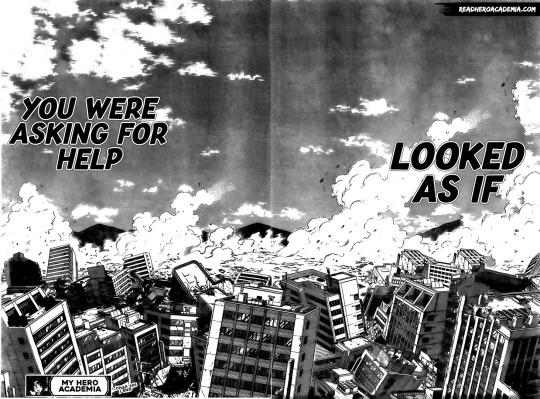
So let’s talk redemption in BNHA-verse. With this guy, whose redemption arc I dislike in principle but accept as part of the story so don’t come for me stans and/or antis. I’m analyzing because it shows us what redemption means in BNHA-verse, whether or not that is satisfying to you personally as it fits/does not fit with your own morality/philosophy.
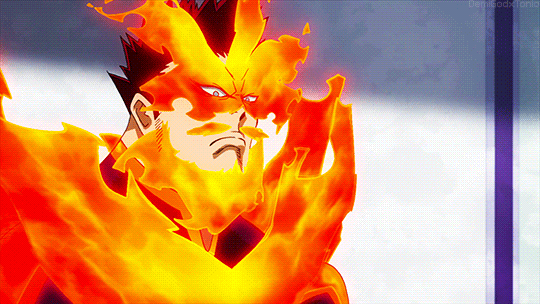
If Endeavor can be redeemed and live, and he’s Bakugou’s negative foil, I highly doubt Shigaraki and Deku as well as Touya and Shouto and Ochaco and Himiko will be any different. Why? Because Enji is an adult character. The others--well, Himiko’s age we don’t know, but we do know that Shigaraki and Dabi are technically adults. But does the story consider them adults?
(It doesn’t.)
Child-coded characters are generally more likely to survive a redemption, which I’ll explain more later. First I have to define what I mean by child-coding, because I DO NOT mean this in the way it’s often (mis)used in fandom wank. Child-coding is a real thing, but it is not done to infantilize and it has nothing to do with shipping.
Child coding frames the character as a child for a few narrative purposes to convey a story’s theme or purpose. For example, if it’s a coming of age story coding a character as a child even if they legally are not emphasizes their journey to an understanding of self-actualization, or a true understanding of self with self-awareness and an understanding of self-value. An example of an adult coded as a child is The Kite Runner, wherein Amir is a legal adult for half the story, even married for fifteen years so we’re talking 30s-40s, but he does not truly become an adult until he returns to his homeland and takes responsibility for a childhood sin. In Attack on Titan, the main characters are now nineteen, but are still struggling to take responsibility as adults and have only started doing so now that their mentors/parental figures have started dying.
Along those lines, in any kind of story, you can code a character as a child of someone, regardless of biological relationship, to convey the type of relationship they have (usually a mentor one). For an example of this, see Bungo Stray Dogs’ Dazai and Akutagawa. Despite their two year age difference, Dazai recruited him to the mafia, abandoned him, and Akutagawa desperately seeks his approval. Usually in these stories a character will “overcome” their parental figure. This can be done through overcoming their need for the parental figure’s approval in stories where the parental figure is kindly (such as in Harry Potter, when in the final book Harry, Ron, and Hermione leave the Weasleys to find the Horcruxes despite Mrs. Weasley’s please) or through like, killing/stopping/leaving the parental figure when they are abusive (see fairy tales like Rapunzel and Cinderella). The parental link to self-actualization is because it is childlike (and a part of actual psychology that is reflected in literature) to see yourself as a part of your parent; self-actualized person would see yourself as a distinct person from your parent, but also acknowledge the ways in which they’ve shaped you.
So, how do you code a character as a child? BNHA isn’t subtle about it, because Horikoshi seldom is subtle about anything. The villain trio are all coded as children.
Shigaraki Tomura:


Who cannot achieve self-actualization so long as AFO has access to his body, as he’s literally trying to possess him. He’s trying, but it’s not gonna work because Shigaraki can’t keep AFO and become an adult at the same time. It’s a choice the narrative is setting up: your dream of destroying, or your freedom? (To get the latter, he’ll probably have to destroy AFO).
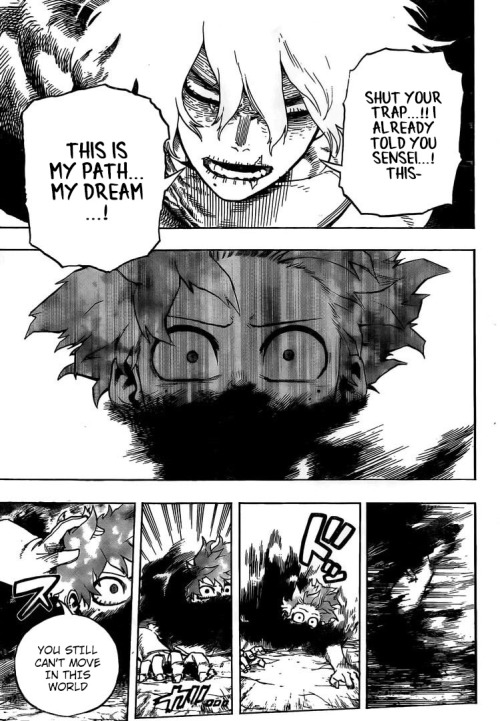
Todoroki Touya, who is repeatedly emphasized as a small child when compared to his siblings, and yes, I know he’s now tall. Specifically he’s spotlighted as the child of Endeavor:
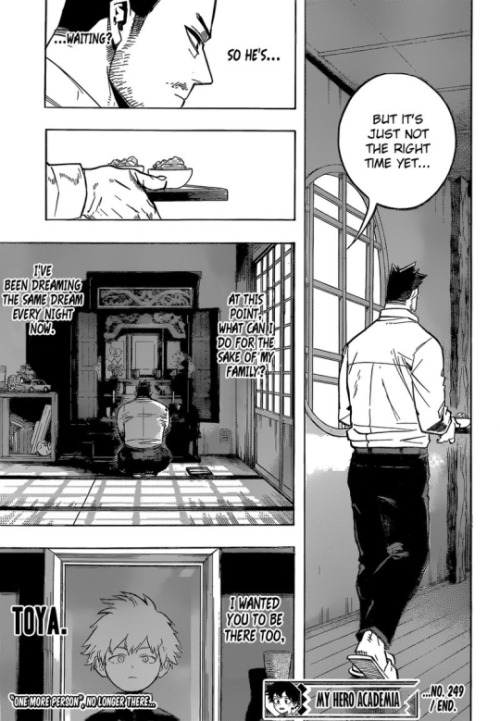

And he’s the least self-actualized one in a lot of ways, contradicting himself constantly. I’m not Endeavor, DUH! But these are Endeavor’s flames! He’s gonna have to choose one or the other, because the tragic irony is that the more he takes out his rage on those around him, the more like Endeavor he becomes.
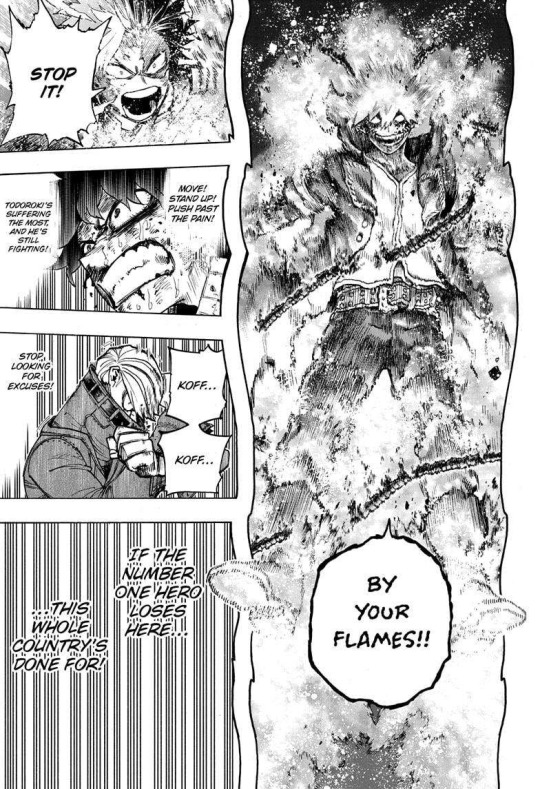

And Toga Himiko (who might well literally be a legal child), who is actually the most self-actualized one thus far, because she rejects Curious’s child insistence (Curious holds her in a Pieta pose, based on Michelangelo’s statue wherein Mary holds a deceased Christ):

She’s still got, like, a way to go though:

Because Himiko also wants to be like the people she loves to the point where she loses her own identity in them, which is er, not self-actualization. So she’ll have to choose whether or not she really wants to be like the people she loves or whether she wants to live her own way, which she herself tells us how that would end (death):

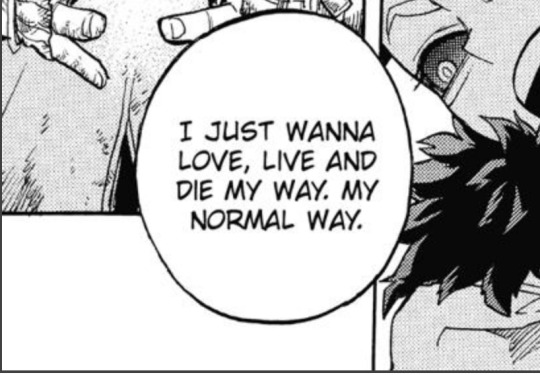
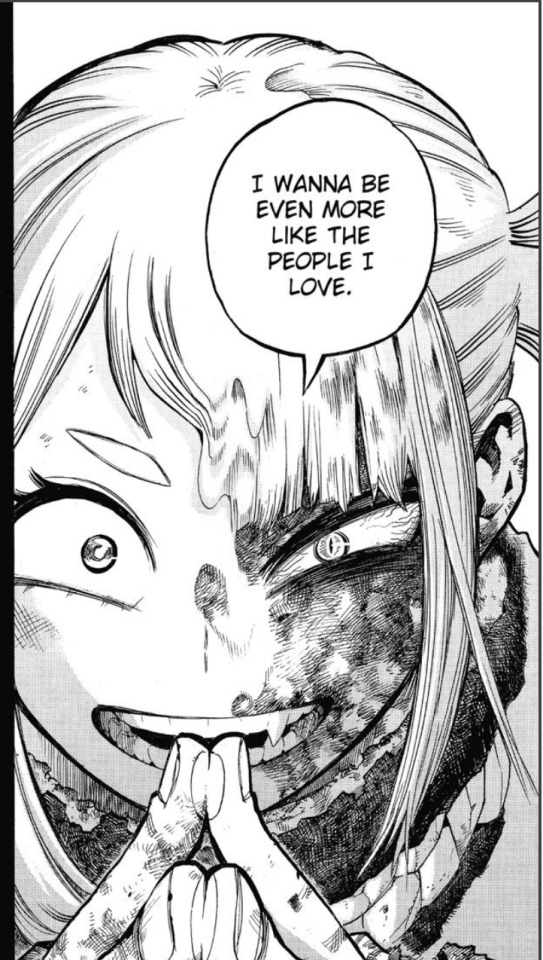
Deku said it himself: it’s good to focus on what someone is doing now. And look, I have issues with this statement and how it’s framed. I’ve talked about it at length and it was doomed to fail because Shouto himself told us long ago that it was annoying to hear a righteous speech by a stranger when you hadn’t gone through the same, plus Endeavor kinda failed by choosing being a hero over a dad here. But, the principle is that if the past doesn’t preclude Endeavor from seeking a better self, why would it preclude three characters coded as children, one of whom is literally somewhat the product of Endeavor’s sins? BNHA doesn’t think the past keeps someone from a better future.
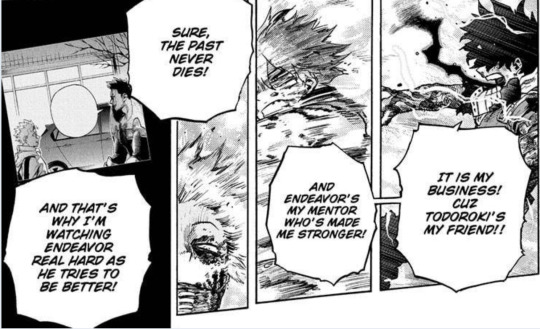
So what about Dabi’s counterpoint, which is indeed valid? Well, redemption doesn’t mean the past forgets, either. It’s complicated and nuanced, and we can debate how well Horikoshi strikes this nuance (it’s got its flaws), and admittedly I don’t know how this will go down in the future. But it is asking Endeavor: how do you redeem yourself to the people you’ve hurt? And we have Endeavor asking this question to Touya’s shrine. I mean, the foreshadowing is obvious. Endeavor has to redeem himself by trying to save Touya. However, it will still probably come down to Shouto to save Touya.

For our three villains, it’s a little harder to predict... well, sort of. For Shigaraki it’s extremely obvious: he has to help take down AFO. Dabi probably has to do something to help his family (siblings probably), but it’s vague. Toga needs help and not condemnation, but presumably she’ll help Ochaco with something.
So, is this redemption? I’d define it as redemption in the eyes of the narrative. To address what makes a redemption is another essay unto itself, but if we bring in the oft-compared Star Wars example: did Darth Vader get a redemption? Did Ben Solo? Everyone says yes to both. However, only Luke witnesses Vader’s redemption, and only Rey Ben Solo’s. So the rest of the galaxy? Doesn’t think so. When I say they’ll be redeemed, I’m defining it as their role in the eyes of the narrative, not whether or not society will accept them or even whether their victims will forgive them (of note, in canonical novels, Leia never forgave Darth Vader despite learning he was her father and obviously knowing Luke’s account of his redemption was true).
So, redemption in a narrative doesn’t mean all of society has to forgive and accept them. Dabi has still like, murdered 30 people--many of whom were thugs, but he himself acknowledges they didn’t deserve to die. Additionally, he himself also acknowledges that the families left behind--their feelings matter:
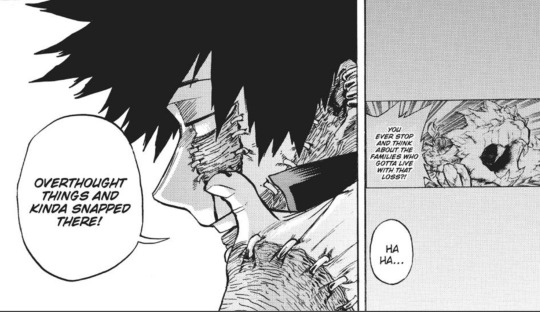
But why does that mean they have to die? Why even does it mean they have to languish in prison forever? (If there’s even a safe prison at the end of BNHA which I kinda have doubts about.) Heroes have also killed: see Hawks as Exhibit A. In fact, some people want revenge on the heroes precisely because they arrested or killed their loved ones (jail isn’t held up as a rehabilitative place in BNHA’s world. In most countries it isn’t in real life, either, but again that’s for another essay). So why don’t the League’s feelings on Twice’s death matter just as much as the feelings of unnamed and unseen (and thereby less important narratively) characters?
Additionally, regarding death... the villains routinely get called on their death wishes. Himiko’s determination to decide how/when she dies is called out because this is right before Twice overcomes his trauma to save her, and the next arc they appear in is when Twice dies trying to save her again. Dabi’s suicide wish keeps him from getting close to others, and it keeps getting thwarted. Shigaraki’s obsession with destruction and death is clearly not a good thing, and his rejection of his family’s desire for them to join him in death this past arc is growth.
In other words: what Dabi said and what Snatch said about families and how they feel matter for the villains too. The villains are their own weird found family (Dabi as the deadbeat prodigal brother of both his families). Their deaths--Magne’s and Twice’s thus far, and I’m not ruling out further deaths in the future--affect the others. People’s feelings on losing loved ones matter. The villains are people, as Himiko said herself this arc:
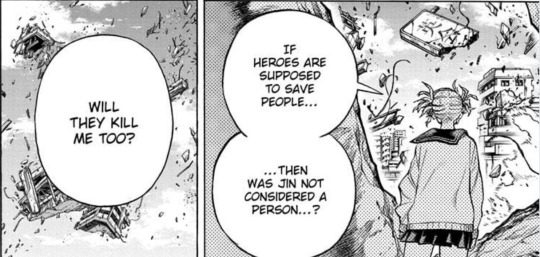
Their feelings about each other matter:
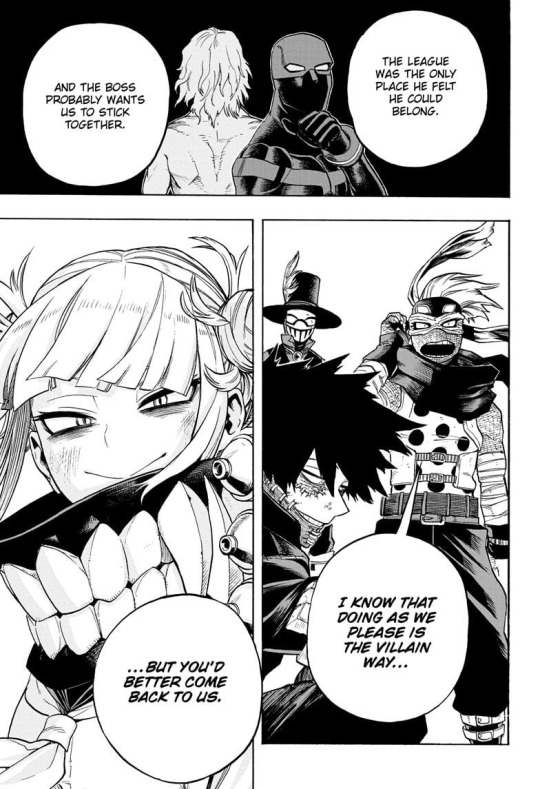
How would Touya dying affect the Todorokis? At least they saved him spiritually, I guess, but that’s absolutely lame narratively, and if you have Enji eventually do a sacrifice to save Dabi (pretty likely, even if I personally think Enji will survive said sacrifice) then what’s the point of Dabi dying? How would Himiko dying affect society? As a martyr like Curious wanted her to be, even a redeemed one? A tragic warning story? What even is the point of Ochaco saving her if that’s the case? If Shigaraki dies, well, who would mourn besides Deku? How would Shigaraki dying affect the surviving members of the league? He just couldn’t be saved physically?
It’s not impossible some of this happens, but it doesn’t seem like great writing, especially with panels like, oh, these that show us BNHA’s perspective on death:
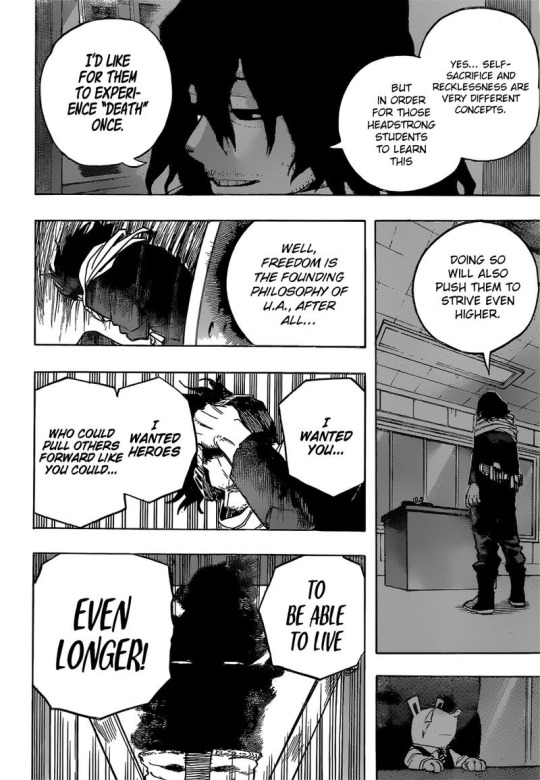
Sacrificing something is a type of death that occurs in stories; this should happen in a redemption arc, which is why I’ve been saying Enji needs to sacrifice his hero reputation to help save Touya and even then it’ll still be Shouto imo who does the saving. But physical death?

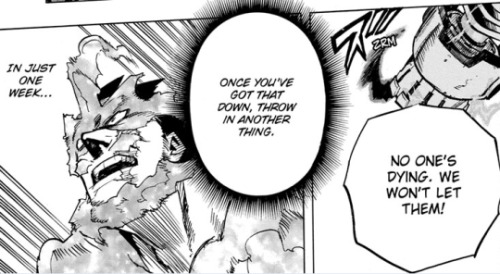
If you want further analysis of the latter two panels and how they relate to the ending, see here.
We already have another villain who will definitely die redemptively (Kurogiri--an adult coded character--because he’s already, like, dead), and Spinner and Mr. Compress aren’t coded as kids so I hold them with anxiety towards the end. But again, this isn’t me being ageist or saying this is the way things ought to be in fiction or real life: it’s me looking at writing tropes and saying that child-coded characters tend to survive their redemptions. See: Zuko. Why? Because the death of children or child-coded characters is a tragedy. When a child-coded character dies redemptively it doesn’t feel like a happy ending and if framed as such, it’s often criticized for bad writing (see: Ben Solo). Curious even called this out in her fight with Himiko. I would hope Horikoshi doesn’t end the story being like yeah Curious was right that’s the best use of Himiko’s/Dabi’s/Shigaraki’s arcs:
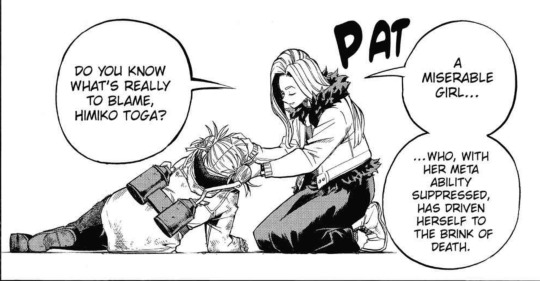

Additionally, as for the believability of a character getting a new chance after so much destruction and murder... well, it’s kinda a thing in shonen and even in seinen? For better or for worse, it’s a thing. We have Vegeta in Dragon Ball Z and Kaneki Ken in Tokyo Ghoul (Kaneki, by the way, is absolutely an inspiration for Shigaraki). We can debate how well-written these redemptions are (I personally have been quite critical of Kaneki’s despite wanting it to happen narratively), but it can be done. BNHA’s Japan especially isn’t as harsh a world as Tokyo Ghoul’s Japan, so it would make even more sense for something like Kaneki’s ending.
The reality is that the cycle of revenge via hurting people and then leaving hurting families and loved ones has to stop somewhere. Someone has to be the bigger person and step up and be like “naw.” That’s heroic. That’s brave. That’s sacrificial itself. Justice itself doesn’t really exist in its purest form without mercy.
There’s another genre-reason I don’t see death or jail as likely (I could see, like, maybe a mental health ward like Rei’s? But it’s too soon to speculate).
If saving is considered a good thing for the story, if it’s truly the highest ideal, then saving someone should be rewarded by the narrative. The characters who save should have a positive result to show us this a good thing.
This is why it doesn’t work for the heroes’ end journey to be accepting that some people cannot be saved. The notion of just accepting that you cannot do something, you cannot save everyone, you cannot, cannot, cannot, is called out as a flaw of society. Determination, on the other hand, is rewarded.
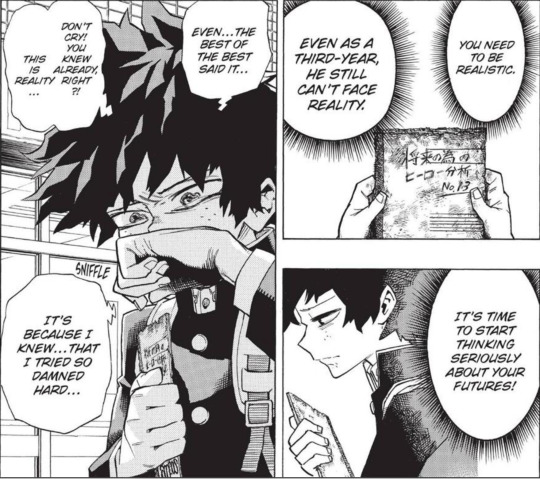
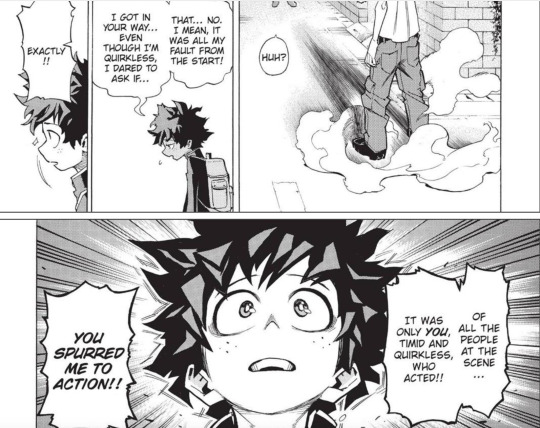
We see it with Deku as well as with Mirio.
So, what if they save them and the redeemed characters then go on to sacrifice themselves in their redemption and die (come to the same end)? If saving changes absolutely nothing for the saved person, if it’s too late for the saved from themselves to change and/or do anything that matters besides die, then the narrative theme of saving as important is left unemphasized at best and undermined at worst. Simple intrinsic knowledge that the kids “did the right thing” doesn’t cut it for a story with so much focus on physical saving when the kids are already doing the right thing; moral struggles about whether to choose to be good aren’t really Deku, Ochaco, or Shouto’s arcs. It works for Aizawa’s arc with Kurogiri, but not for the kiddos. If BNHA was more of a philosophical/spiritual text, that would indeed make sense, but it is not. Genre-wise, BNHA is a fantastical superhero optimistic story, not a gritty real-world set drama.
#bnha meta#mha meta#bnha 295#mha 295#deku#league of villains#shigaraki tomura#shimura tenko#todoroki shouto#todoroki touya#todoroki enji#endeavor#todoroki family#toga himiko#all for one#afo#uraraka ochako#bakugou katsuki#aizawa shouta#bnha theory#mha theory#my hero academia#boku no hero academia#midoriya izuku#kurogiri
636 notes
·
View notes
Text
i was a bit confused by other people’s confusion as to why chuck started acting a lot more humbled and, honestly, a bit more soft spoken and nice after his face-turn, and this post poses basically all the things i was thinking about the reasons as to why, BUT ! am i still going to make a sprawling post talking abt how i think its all these reasons kind of interlocking ? Absolutely I Am
anyhoo. as i saw some point out again in the tag chuck is a kind of "might makes right" kind of guy-- but it's not just the strength that makes chuck so fervently loyal to him, it's his (percieved) guts and determination to take what he wants and needs, and we kind of see chuck trying to emulate that quality. he tries literally everything he can think of to get the great leader to come down and do his cool great leader stuff; getting literally severed in half and captured overall doesn't stop him, he goes above and beyond any generic grunt alien by not only getting the leader down here, but by destroying the morale of the hero ! (that line he says that everyone thinks theyre the hero in their own story is interesting, though. might return to that separately some day)
that being said, i think also it's interesting that when the great leader turned out to be a coward, chuck still tried to cling (somewhat literally !) to his faith in the great leader and his sort of place in his grunt alien status. i think it's when the great leader kicks him off of the platform and leaves him for what one might assume to be dead is when chuck really starts having everything sink in for him; bc the other thing chuck really seems to like/want is validation, from those he looks up to specifically. he thinks the great leader will reward him, yes, but it seems like even more than physical reward, he wants praise. he wants his great leader to see him as special, and maybe for the others of his ilk to idealize him similarly to the way he idolizes their leader-- i think it’s fair to assume chuck and his peers werent afforded much in the way of individuality.. i cant provide screencaps bc netflix hates me, but in the scene where his leader shows up, he goes from “it’s me, chuck” to “er-- well, i’m the one who called you...” when the ol’ GL gives him something of a withering look for providing a name... and he specifically says “i don’t wanna be stuck chuck anymore” to him before his leader kicks him off and leaves him for dead ! the text... * chef’s kiss * Delicious
so, seeing as chuck kind of polarizes-- the GL and his army are all abandoning cowards, while The Kid (who saved him, that’s likely still fresh in his mind too) turned out to be more true to the idealizes chuck was prizing in his leader this whole time. i think his next logical leap is to try to think, well, where does kid exactly get his bravery and determination from ? we as the audience get to figure that there’s a couple of different contributors to this, but with the time that chuck’s spent with kid, he knows kid adheres very strongly to the idea of your classic comic book superhero (even if the kid’s understanding of what makes a hero is also a bit misinformed, but, if youre reading this youve already seen the show, you know how kid grows. thats a different post). and we know hes also been reading quite a few comics, so he knows what their idea of a hero (and a heroic subordinate) are: brave, confident, charismatic, magnanimous... in a word, nice !
also, chuck brings up that speaking english without his little doohickey is painful for him.. whether he meant physically painful or in more of a sense of his pride, both seem equally likely to me, but ! the point still stands ! it’s hard to do the kind of long, pithy comebacks and verbal take-downs hes been trading with people if speaking hurts him. and while he did say the pain was one he would endure for the sake of the kid, at the end of the day, saying the nice thing is 9 out of 10 times a whole lot shorter than the mean thing
with these last 2 points though, i think chuck-- while actually committed to being reformed and a good guy now !-- has a lot to learn about what’s actually the spirit of good-guy-ness vs the form. he still has little hints i feel like (his little cry of “you disrespect Kid Cosmic !!!!” felt very reminiscent of the way he talked about his old leader i feel like, and when he, oh yeah, SHOT A TRUCK. WITH A REAL GUN. LOVE THAT THEY LET YOU GET AWAY WITH THAT ONE, CRAIG AND CO) that shows a lot of his “niceness” now is emulation vs actual true understanding of how to be nice. i’d hope we’ll see him learn the actual difference and better ways to grow and be a good person onscreen, but also since s2 will take place 6 months after the final confrontation of s1, it might not happen..
maybe we’ll get allusions to it though ! in either case i would love to see chuck having to learn to actually mind his manners around people who aren’t the kid, or really the other Local Heroes.. i feel like papa g and rosa would both be great for him to have those interactions/lessons (papa g has that vibe and was actually one of the first to be willing to take a chance on chuck, and rosa is 4. you met a 4 year old ? Yeah) regardless ! chuck :]
146 notes
·
View notes
Text
"That's Not What The Show Is About"
Be that romance, family, or ethics -- we've all seen this line. Some of us have even said this line. Myself, never personally -- but even people I know and respect have had their song-and-verse about what they say the show is -- or isn't -- about. It's often thrown at fans of differing thought; sometimes, it's thrown at creators, such as to accuse them of not knowing what the show is about.
So there are several things to approach about this, in the end. What a show communicates to you -- truly communicates to you, that you truly see standing as the message -- is valid. But one has to understand. That's what it means to /you./ You can't determine what someone else receives, genuinely receives, out of a work.
This says nothing of hyperinflation of arguments with angry fans in egregores that are all mad with All The Things. At some point, your interpretation stopped working for you, which is a personal thing to choose to overcome, subvert, to work around amd find answers and alternatives to, to stop watching or yes, to stay ragemad. That's your own agency in play and I've discussed this before, but beyond this disclaimer, not a point of this post.
I want to move forward about when this is thrown at creators.
When SPN started, or before it started, Kripke pitched oodles of ideas, some of which were retired before it ever hit air. And when it first made air, it was the mood and idea of the piece, the concept of monster hunting, that was the draw. Kripke said himself, from his mouth to fandom’s ears, that it wasn’t until a few episodes of watching the natural chemistry J2 had that they realized they needed to focus more on the story of the brothers than the circumstances they battle through as generalized archetypes.
At that point, the show changed what it was about.
By the time season 5 ended, there was already a written moral. They chose family. It was about family. That’s the whole point, right? But when this show launched, in its first few episodes, it hadn’t been. The creators elected to explore an evolving concept. They chose to explore many things, and fandom often crowed what the show was and wasn’t about, even back then, as far back as the first few seasons. But here’s the thing.
Shows do not have true agency of their own, but rather, the agency of their creators. The fandom’s agency ends at their ability to choose whether or not they like a given show, or what they do within their own digital sandboxes with the content. The fandom does not own the content. The fandom will never own the content. The fandom reacts to the content. You can like it or not like it, but the show is about whatever a creator wants it to be about.
Sure, early on “family” mostly reduced to the brothers. Because uh, y’know, brothers are family. But what “family” means to people and the scope they should take that storyline can also change. How Kripke, Carver, and Dabb see family are not guaranteed to be the same. That doesn’t mean they changed the underlying value even, just the angle and presentation. Yes, adopted kids are family, or potential spouses are family, or crazy aunts are family, it’s all family. But this slavish dedication to, for example, “the show is about two brothers.” I mean, yeah. And it still is. It’s about a lot of shit. It’s multidimensional. But the angle of presentation. But this idea that it’s literally ONLY about two brothers ended... ages ago. It was about family. It was about ethics against dire circumstances. These things still live on.
People can not-like a given angle. But they do not have the authority to yell at a creator that they’ve made the show something it isn’t about. The writer decides what a show is about and how to present it. Personally I see perfectly well how these flowed one concept into the next and stayed true to a very old part of the show, but others don’t. That’s fine. But also if they decided to completely cut the family values out of the show and make the villain the purple tentacle space orcas from planet Xenon, no matter how fucking stupid I would think it is, I’m not entitled to @ the creators and tell them that isn’t what the show is about. Because it is now. The end. It’s now about purple tentacle space orcas against family-less brothers and there ain’t shit I can do about it beyond choose to watch another show that isn’t about fucking purple tentacle space orcas.
I can say I feel it’s stupid. But I also can’t @ people that, for whatever fucking reason, like the purple tentacle space orca shit and tell them it isn’t what the show is about. Because, quite clearly, there’s goddamn purple tentacle space orcas on the screen even if I try really, really hard to interpret them as Leviathan vessels based off of someone making a dick joke. It’s fucking goddamn purple tentacle space orcas now, the end, like it or leave it.
Shows change, they adapt. Some people like the way it adapts. Others do not. Welcome to individuality. Not everything is For You. And hell, there’s a lot -- and I mean a fucking LOT -- of fandom hot takes that I, personally, think are extremely divided from the show. I mean big ones. Mainstreamed concepts in fandom egregores. Never falling into those thought processes and walling them off as absurdism to me somehow kept me from ever being upset with the resulting content or building expectations based on those thought processes, but I guess we’ll just pretend it was unrelated and I was lucky. But just because you build a group of people with a thought process, if that thought process does not pan out long term, that doesn’t mean you’re Right-Er than the creators that are actually making the piece and determining what the show is about. Your vision deviated from theirs at some point.
Fandom needs to understand, ESPECIALLY at the end, we do not own the piece, we do not get to declare what a piece is or isn’t about. Frankly, I want that fucking phrase to die in a salt-and-burn fire under the tongue of Chuck using it in meta-narrative statement like many other fandom statements have been drawn out by him this year. Maybe I’ll get it. Maybe I won’t. That’s cool. It’s not my piece. I can hope for it. I can’t demand it or call it a failure if it doesn’t.
But this idea of possession of the product not only is gonna lead people to a final resolution that they get confused and angry by, it has built angry wings for /years and years and years/ because their imagined ownership and belief in what the show should be continues to diverge from what the show is actually doing. And that’s... not the show’s fault, it’s really not. No matter how mad and blue in the face any of us get, it’s not, and it will never be. The balance of self care on continuing watching/refusing to figure out why we’re mad/not adjusting expectations is a thing for fandom to process as grown adults. The right to not like it is one thing. The idea of talking about creators themselves not knowing what the show is about is not just comedy though -- it’s literally the problem.
Think about it. S’all I ask.
23 notes
·
View notes
Text
yalright let’s do this
AGENTS OF SHIELD SEASON ONE REWATCH COMPLETE BREAKDOWN MEGAPOST
hella spoilers for the entire canon up through season 5, but not 6 because I only saw it the once and am having a hard time remembering ANYthing about it.
I cannot determine specifically what it was about this season that caused to be branded “literal garbage” in my mind-hole for seven years.
Best guesses:
there’s some cheesy stuff that probably didn’t sit well with me at the time, and, at the time, there was no way of knowing that that kind of stuff was going to be ultimately eradicated
there’s some good stuff, like character stuff and plot stuff, but it didn’t successfully implant positive emotional responses in my brain-hole, leading me to be frustrated/offended at its own self-importance
there’s some stuff that just Doesn’t Work. I won’t call anybody out, but there are some main side characters whose casting, in my opinion, leaves much to be desired. when it comes to acting ability, I feel that it’s important to have the ranges of your entire cast match each other. if you’re gonna hire B-listers, at least make sure they’re ALL B-listers. if you’re gonna splurge and get some S-tier talent, pleeeeease don’t embarrass the B-listers by thinking you’re doing them a favor by including them on your project. Understood, this opinion is highly subjective and I can’t expect everyone in front or behind the screen to buy into it, but it’s definitely a pet peeve of mine that causes strong reactions in me*
some of the plots are tired and/or straight up boring. I got through them easily this time through because I was able to focus on the things I like, which is largely character interactions and re-learning the backstory for stuff that I know will continue to be important later on. imagine listening to your grandpa’s stories about his life, but instead of telling you the cool stories about going to the moon or whatever, he’s telling you in great detail about the time he got his shoelaces stuck on like, a rusty nail sticking out of a fence. It’s not a great story but it does explain why his mom only bought him velcro shoes after that and one time when they were trying on shoes in the store a couple of years later, some other kid started making fun of him for having velcro shoes and long story short your grandpa’s relationship with that kid is what got him interested in astrophysics and also he married that kid twenty-five years later -- but right now the story is specifically about spending forty minutes trying not to get tetanus.
Now that I’m older and wiser, what really surprised me throughout, though, was that not only was I not having any type of reaction that validated my “literal garbage” classification, I was noticing that there was A Lot of stuff that ticked a lot of boxes.
I’m talking technical stuff, the textbook basic filmmaking stuff, the stuff that I subjectively find objectively “Good” because it means that creative decisions were made with intent and were also executed proficiently enough to make that intent clear.
I’m talking SYMMETRICAL NARRATIVE which has to be one of my all-time favorite techniques, one that I personally use a lot, and I’m very biased in responding favorably when I see it, so I think ultimately this is a huge reason why this season cannot be classified as garbage this time around. Because it shows that they cared! It shows that they had A Plan! It’s an emotionally satisfying technique that can be used to great effect when tipping the audience off to how far we’ve come from where we started. It creates this nice tidy structural loop which I find very appealing.
Just real quick, you see this in individual episodes or even scenes, too. Here’s a classic A+ example from episode 2:
Simmons has given Skye a bottle of water as a gag because that’s what happens on planes, and that bit is a set up to this bit, where Coulson is talking about how he rebuilt the Bus from the “studs up” and it demands to be treated with kid gloves; ergo:
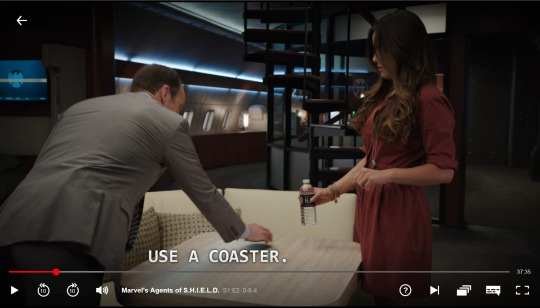
Only to have the thing completely wrecked over the course of the episode. In the denouement, “just starting to warm up to this place,” Coulson says ruefully, righting a broken glass as if that will put the plane back together; Skye immediately tosses a coaster down and moves the glass on top of it.

As a callback, it juxtaposes the starting-state and ending-state in your mind and highlights the contrast between the two. And it’s also a nice character-building beat where you, the audience, get to observe Skye’s character in that she remembers a trivial detail that happened to be important to Coulson. You also get to see Coulson observing the same, and you understand a little bit more about both of them. *chef’s kiss*
So this is a pretty powerful and common technique, and I guess you could say that any well-resolved narrative is by definition going to recall you to the specifics of how it started. Like ep 1 we start with Mike and Ace, their call and response “what are we/we’re a team,” and an understanding of Mike’s desire to be his kid’s guardian and hero and his desperate search for the tools that will allow him to become that. In the finale, we see the pay off where Ace (via Skye) reminds Mike of this motivation, and Mike is finally in the position to protect his kid by taking out the Big Bad.
But I don’t want to go through the list to demonstrate that everyone’s character arcs likewise left them in a thematically resolved position relative to where they started. Obviously this is an expectation of all (well structured) narratives.
(And I don’t really mean to talk about callbacks themselves, such as Fitz’s obsession with monkeys or May’s repeated demand of “don’t call me that.”)
Stuff that only comes up at the beginning and the end. Here’s the kind of symmetry that I mean:
Skye’s use of GPS encryption and the location of the diner where she first meets Mike. Both topics come up in ep 1, and are revisited in ep 20 when she’s stalling for time against Ward and brings him to the diner by telling him that it’s the GPS coordinates necessary for decrypting the drive. It says, last time you were here, Skye, you were living out of a van and fangirling over people with superpowers; now you’re an official agent of SHIELD (fun while it lasted, anyway) and you’re currently doublecrossing your own doublecrosser who was directly responsible for transforming you into the competent spy you are today.
Same thing: the only time we see Lola fly is at the end of ep 1, when Coulson and Skye are heading back to the Bus, and in ep 20 when Coulson rescues Skye from off the Bus.
Ep 2: 0-8-4. We’re introduced to the very first object with the titular designation, and Simmons idly wonders “imagine what it would do to a person.” Ep 22, it’s used to evaporate Garrett. Same ep, we also meet the little, what even is it, that dendrotoxin EMP (??? I don’t recall whether the gadget is named) that Ward uses, and Coulson uses it in ep 17 to incapacitate Garrett.
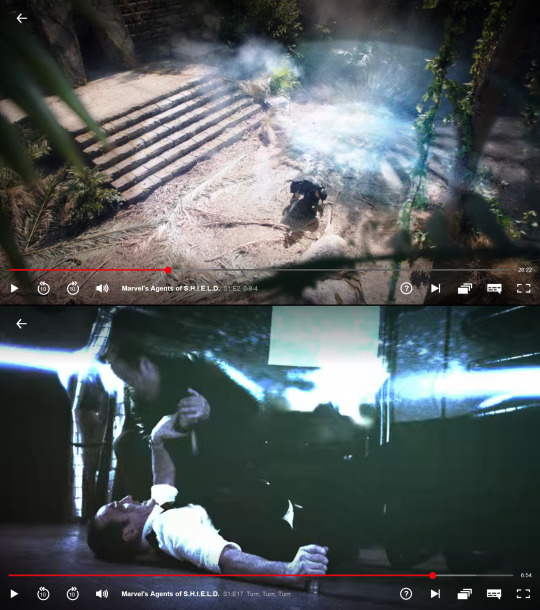
Similarly, all the cool alien gadgets we spent the first few episodes gathering and locking up, including that first 0-8-4, are all broken out into the wrong hands in ep 18.
Also in ep 2 we are introduced to the idea of being thrown out of the airplane and Skye & co specifically prevent Ward from being sucked out. We’re introduced to the concept of Coulson’s cellist! Fury also makes a cameo (”talkin to me about authority”) !
It’s a little later on, but ep 6 has Simmons jumping out the plane, and Ward proving his Good Teammate status by jumping out after her (while Fitz is struggling on his way to do the same). Ep 21, Ward boots FitzSimmons out the plane, and in ep 22 Fitz finally has the chance to properly save Simmons himself.
Ep 19 Coulson has a chance to save his cellist (again)
Ep 22, Fury comes back all Deus ex Machina and relinquishes authority of SHIELD directly to Coulson.
There’s also some dialogue recycled on purpose to make a point, like Fitz-Simmons introductory scene is recreated almost verbatim in ep 21:
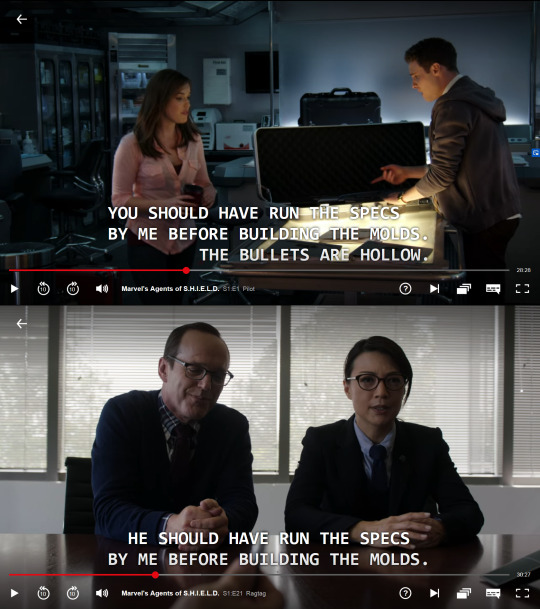
Ep 2, talking to Skye about his mission vs ep 18 talking to Raina about his mission
(gotta admit, the man took this role seriously. check out that cheekbone game he achieved in such a short time)
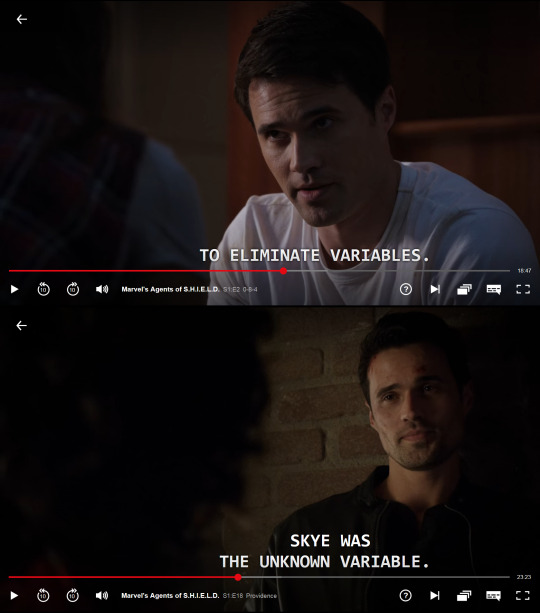
And again, Ep 1 Ward vs Ep 18 Ward. They even framed it the same!!

All this to say, Season 1 is Structurally Sound and it has my blessing.
Now let’s move on to the list of things I liked that surprised me:
It’s pretty well polished, visually. Joss Whedon’s veteran control of the director’s chair is readily apparent in the pilot, setting the visual tone for the series. There are some made-for-tv shots over the course of the season, sure, and the least impressive compositions tend to involve CGI backdrops, but they do make the most of their interior sets and work hard to dress up various LA locations to, er, inspire the idea of the international scope of the show. In my last update, I talked about ep 8 The Well in the context of Quality Directing, so it definitely goes above and beyond the basic shot-reverse shot when it wants to.
Ward. Just for the record, I think Brett Dalton is great at his job and really brought exactly what they wanted to this character. Eps 1 and 2 are a little shaky and stiff, but everyone’s performances are, as they let these characters coalesce around them. I remember not liking Ward when I was watching this live, and honestly I think this was intentional. He’s that character that you expect that you’re expected to like, you know, the traditional cocky savior type that lots of those fancy heroes are. But because he’s so tropey in his characterization, you’re just ... over it? And then when they flip the script and you’re supposed to hate him -- WOW. It’s like two Christmases at once. They took something you were already doing and rewarded you for it.
I’m not unaware of the “redeem grant ward” phenomenon. I’m aware that the character had fans who were honestly drawn to and appreciative of the character before that persona was revealed to be a lie.
And honestly, it’s not that I like OR dislike Ward at all. As a person. It’s annoying that he’s a cocky bad-boy. But it’s sweet when he plays nice with Simmons. It’s embarrassing that he and May have “a thing.” But it’s cathartic when he opens up to Skye about his past. And Then, the sequence where we know he’s Hydra but Skye doesn’t. And Then, the sequence where Skye knows he’s Hydra but he doesn’t. And Then, his weird yucky confusion where he still wants to pursue something with Skye or doesn’t want to put down puppy-dog-eyed Fitz.
As a character, Ward is a great character. His set up is so bland that the twist does appear to come out of nowhere, but on a rewatch all the groundwork is there. His characterization as a baddie is enthralling. I’m forecasting into season 2 a bit, but you want to follow his nefarious exploits just as much as you want to see his ex-friends smash his face in. Brett Dalton played it right, A+ good job. It makes Framework!Ward just that much more of a beautiful thing, to get to see what it would have been like if the Season 1 persona had actually been the man.
Also as covered in the last update, I was really very pleased to see how much character work was being done in this season. Because I only watch and rewatch starting from the second season, there are important plot points that I’d been grudgingly attributing to this season about which I’d forgotten the specifics, such as, what’s the deal with Gravitonium, howcome we hate Ward so much, where did they get that memory-torture-machine, why are you acting like I recognize Titus Welliver’s character? What surprised me was how much of a focus there is on character development as well. A lot of good origin story stuff, like how green FitzSimmons is and how soft and good-hearted Skye is and all the reasons we respect and trust May and all the reasons we would follow Coulson to the ends of the earth. Watching a found family start to put down roots is worth it, too, ten times out of ten.
The tie-in stuff wasn’t as overstated and stifling as I remembered it being. They were allowed quite a long leash even this far back. Centipede is based on Extremis, but helms a a unique narrative. The Asgardians-of-the-week are just MacGuffins for driving character stories. Turns out all of SHIELD has been Hydra all along! Sucks to be you, a show about the Agents of SHIELD ... oh wait, Daddy MCU’s insane twist is mirrored in the DNA of your team’s composition AND baked into your overall season arc? Well then. Carry on!
Engaging with Season 1 explicitly as a prequel is a powerful thing. First time through, I had the distinct realization that “too much of a good thing” was at play regarding Coulson. He’s everybody’s favorite MCU character in 2013, hands down, but ... getting intimate with him for 40 minutes a week really waters down his mysterious G-man appeal. BUT. After spending six+ years with the man, Season 1!Coulson is a precursor to the 3-dimensional Director you’ll fall in love with, rather than a distortion of the one-liner MCU!Coulson you thought you wanted.
So what’s next! Absence makes the heart grow fonder, and here all all the things I associate with AoS that were not present in Season 1:
Robot hand.
DaISy JoHnsOn
AGENT/DIRECTOR MACK where is he I need him
Fitz’s facial hair
Their underground SSR base with the exposed brick, I miss that place all the time
Hive, Bobbi*, Hunter, Kyle MacLachlan, Maveth (everything** about Seasons 2 and 3, really). Robbie Reyes. Aida and Kasius!! I know these things are temporary, but they’re so important to the best bits and I love them.
Getting to see episode after episode where there are scenes at a time containing a majority (up to 100%) of women and/or POC characters with executive agency, and none of those characters are token or temporary but were placed there with intent to normalize a diversified cast.
My absolute favorite episode of all time, 4x15 Self Control.
Things I am not looking forward to:
**Lincoln. I’ve seen these seasons four times and just now I had to google his name because I wasn’t sure it wasn’t Logan. He’s garbage and I’m glad he’s dead. Other opinions are available.
Misc. Thoughts
*I said I wouldn’t name names but Adrianne Palicki is a C-lister who can swing a B+ if the stars align. I love Bobbi, though, especially the way the character’s reputation precedes her, how her adorableness complements her badassness. In fact, the character’s a great foil to May, who is also a badass lady and S-tier agent but has a completely different approach to being those things. Bobbi’s a reminder that badassness and aloofness are not correlated at all. Also there’s a headcanon out there that she’s non-binary (one of the reasons she prefers Bobbi over Barbara) and that is a concept I can get behind. Bobbi’s perfect and I’ll fight you if you don’t agree.
Poor Trip!!!!!!! When you always start from Season 2, he’s really just a flash in the pan, there and gone. I’ve always been like, “well, he didn’t really have a home here, no carved-out niche, so I guess getting Coulson’d and becoming something to avenge is the best a character like him is gonna get.” But now that I see that he comes late to the game as a literal stand in for Ward, his story is that much sadder. He was never intended to BE a character. He’s introduced with Garrett as a pawn/distraction during this arc’s who-is-Hydra shell game, he’s kept to demonstrate what kind of friend and agent Ward should have been, his defining character trait as a gentle flirt only serves as a catalyst for Fitz’s coming to terms with his feelings for Simmons. The poor guy is just a walking plot point, up until the bitter end. :<
I had entirely forgotten and/or never tracked the fact that Fury put together Coulson’s team specifically to monitor him after project T.A.H.I.T.I. I’d forgotten the distrust Coulson has for May after he perceives that she has betrayed him by being a part of this. It’s a season-specific reveal that is literally never mentioned again. It’s important to the fabric of the narrative of that particular arc, offering up May alongside Ward and Trip as fodder for the aforementioned shell game, but the true inciting incident of this entire show just gets swept under the rug and ceases to matter. I’m kind of :/ about that.
When you’re bi and non-binary, you’ll get a lot of mileage out of wanting to be/be with Daisy and/or Fitz, don’t judge me
In conclusion, Season 1 is the opposite of literal garbage, Agents of S.H.I.E.L.D. is my favorite show and my favorite MCU movie, Daisy Johnson is my favorite Marvel superhero (not related to Season 1 but still true), and nobody had better spoil Season 7 for me pleaAAASE don’t let it happen.
2 notes
·
View notes
Text
Man I dunno what everyone was so mad about I thought the last jedi was great
I have some thoughts
Also I’m ready for the Discourse now so if you guys have posted anything that I skipped for spoilers, please reply to this post and link me so I can reread
I cried, I cried so much at That Leia Bit early on. It was so beautiful. Her sheer determination and manifestation of will to live, after everything that’s happened in real life, god, fuck
I love Leia god I’m gonna fucking cry again right now
This movie’s THEMES though?? I was surprised at how daring it was. They deconstructed, literally deconstructed, Star Wars. The hothead pilot with the daring plan to save everyone that’s ‘so crazy it might just work’, ignoring the orders of his superiors? He’s wrong. He’s so goddamn wrong. He makes everything worse with this plan.
Bold, conscientious, I love it. Is that what guys were mad about?
Luke, originally the optimistic, light-hearted kid living the dream of a space adventure... is bitter, disillusioned, has given up entirely. He had a moment of lapsed morality that ruined everything he’d built and started this whole sorry thing by betraying his pupil. HE betrayed Ben. He couldn’t live up to that ideal of being pure and perfect and good all the time and thinks he’s a failure, so the Jedi order must die rather than be taught by him, someone who can only fail further.
I love, absolutely love, the theme of letting go of old traditions. I feel very strongly about it. It’s something you can notice daily, how we cling to routine and fawn over old documents that have lost their relevance. The Jedi tree with its last library burning up was gorgeous. Over and over again the Jedi had slipped up, made the wrong call, and god knows there’s a lot of insight in the fan community about whether the Jedi are even right about anything. And this validated all that. It’s right to let it all go, to build something that works better, and that someone who’s failed can make the best teacher. Question your goddamn traditions.
The movie was about failure, pretty much. The rebels got what they thought was an important win at the start, and then they were tricked, they got beaten, their lives are on a timer, and they fail and they fail and they fail. A string of events and everyone’s best efforts that just... fails. They brought up hope a lot and it was absolutely deserved, I think, just looking at how the story really, really worked to make hope a precious and rare thing.
I like that Poe learned some humility, after seeing the assumptive general was some older lady and he... clearly had hoped he might get it himself. After being demoted. And then he starts seeing his own leader as a villain and.. like, I’m not imagining it right, I don’t think what Poe did was at all justified. He obviously cares deeply for Leia as we all do and yet when she was hospitalised he didn’t listen to the last advice she gave him. He didn’t try to learn from his demotion. Instead he thinks he might get made general because they were buddies and then takes issue with not being privy to the new general’s plans, putting his own plan into action that ultimately kills tons of his comrades. It’s all about learning from failure and not letting it beat you.
I also liked that this woman, who was set up as Poe’s antagonist, who he held a mutiny against, was supposedly failing the resistance by planning an escape. And she had purple hair. Like, we KNOW what some guys who see this film are gonna think about that. And then it turns out, no, this experienced woman, trusted by Leia, DOES know better than a spunky daring pilot. She IS extremely brave and sacrifices herself and saves the resistance. There’s no reason for her to have purple hair she just does.
God, I am still hung up on the main plot being “the heroes have a cunning plot that might just succeed, and then it doesn’t and it fucks EVERYTHING up”. Like, god damn, thank you.
And it’s about Rey too and I admit I was fairly worried throughout as they clearly connected Rey and Kylo together? Two sides of the same coin kind of thing? But on reflection I think it works. They’re both young force users trying to wrangle their way through emotional turmoil without losing the side they’re on. Kylo is confused by remorse, I guess? For killing his father, he seems to think the dark side means no regrets and yet he has them, so could he be good? Rey is extremely powerful and Luke says she might go immoral just like Ben, so will she stick to her guns despite having no mentor figure, no surrogate father, no parents, etc
Kylo’s redemption was an illusion fostered by Snoke to trap Rey, but it reveals why Rey is on the side of good: she thought Kylo could be saved and threw her life aside to attempt to get him. She was stupid yeah, but tricked by the most powerful person in the galaxy because she is like Luke, and will not give up on someone that might leave the dark side, which is what makes both of them heroes.
Honestly I didn’t see anything wrong with the movie, aside from I guess... I’d say it was heavy on the one-liners, that’s all. Finn didn’t have as much growth as Rey or Poe, but he still got to use his backstory skills, and face-off against his old boss, and god the energy in a black man going hand-to-hand and beating a top agent of a fascist regime who calls him scum? GOD
So many things were relevant and real. It’s always been about Space Antifa but like now it’s REALLY about Space Antifa. The city of abominably rich space assholes who just look good and gamble and rest on a social construct of animal abuse and child labour, who get their shitty 1%er casino smashed in by a stampede? I think we all really needed that right now.
Anything I’ve heard that didn’t make sense I accept entirely. Luke drinking some titty juice? It’s not that goddamn weird. It was showing how he lives on this island, for one thing, and how he’s not a legend, a space saviour they can call on to win the war. He’s just a fuckin old dude living in a cave, milking weird animals for food. The weird island creatures I think people complained about? Wtf do you think Star Wars has always been about if not weird loads of space creatures. Luke’s... ending? What’s wrong with it. He went because he got the closure he wanted, he saved the rebels from Kylo and atoned for his past mistake. He realised Yoda was right and that the galaxy needed to move on from the old order and something new would replace him. And, crucially, he did not stall Kylo by letting himself get killed, I think he needed Kylo to see ‘revenge’ in his grasp and try to take it, to tell the boy that killing in anger would stay with him, to stoke that doubt the death of Han caused, and then reveal that Luke was not ended by the heir of Vader. There’s a big, meaningful difference between Han dying at Kylo’s hands and Luke giving him the option and tricking him, then peacing out on his own terms having moved past his years of guilt.
My head hurts from taking it all in, but hahah, I really thought I was in for a bad movie there thanks to the internet. It was genuinely great.
10 notes
·
View notes
Text
Are you still thinking that there are limited career options in Nursing? If yes, then you are totally wrong as the definition as well as the role of nursing has already been changed along with the medical field in general.
As per the new definition, nursing, as an integral part of the health care system, encompasses the promotion of health, prevention of illness, and care of physically illness, mentally illness and disabled people of all ages, in all health care and other community settings. Advocacy, promotion of a safe environment, research, participation in shaping health policy and in patient and health systems management and education are also key nursing role. It is not just taking care of the sick. Other opportunities for qualified nurses include teaching, administration and research jobs. An interesting aspect of this profession is that a vast majority of nurses are women. However, now-a-days, men are also showing interest in the profession.
Today, we can find hundreds of options for meaningful careers in nursing, with the role of a nurse determined by the level of education and specialization, the type of facility, and other factors. For example, a registered nurse may have an associate’s degree or bachelor’s degree, and an RN license, but the duties of a nurse with a BSN will likely be higher than RN with an ASN- and better paid.
Tips For Getting Hired:-
1. A degree or a diploma from a reputed nursing college is required.
2. It pays in the long run to have obtained a specialization in a particular area of treatment
3. An important prerequisite for getting employed is to register oneself with a State Nursing Council.
4. Since nurses have to constantly deal with the medical staff and patients it is advisable to have good communication skills.
10 demandable nursing career options in our country is listed here which can provide you more information about the roles and their salary:-
1. School Nursing:
Generally a school nurse works without a lot of different supervision from a nursing coordinator. School students are the main clients for school nurses who do wellness screenings as well as providing basic first aid and referral of students discovered to be ill. Medication administration will probably be included in your tasks. A couple of years’ experience following graduation and licensure will probably be a basic requirement. Children with special needs, both physical, and emotional, will probably form part of your clientele; knowing how to respond both personally and professionally may challenge you.
Salary: INR 1.92 Lakh per year
2. Nursing Home-Staff Nurse:
Nursing home nursing requires independent thinking and good assessment skills since generally speaking physicians may not be present physically. Medications and patients with special feeding and elimination needs will probably be included. RNs often supervise staff that performs basic care of clients. Several years of experience in acute care may be required. Persons who either through age or disabilities require nursing care in a nursing home also require a great deal of patience and understanding.
Salary: INR 1.44 lakh to3.82 lakh per year
3. Nursing Home-Head Nurse:
In this position you will probably do much less hands on care, but be involved in assuring that policies, services, and procedures are done as specified by the persons you are supervising. If you staff is primarily paraprofessional you will be assessing, evaluating, and following up the care needs of your clients. Caring for the staff will also be part of your role as you make certain that professional care is happening at all levels within your place of employment. Maintaining a team spirit when staff members are feeling overworked and stressed is important thing of this role.
Salary: INR 2.05 lakh to 3.5 lakh per year
4. Nurse Educator:
Nurse educators combine a passion for teaching with clinical expertise to design, evaluate, and implement education programs for nurses, teaching at schools, universities and colleges. By doing this one can also earn good money.
Salary: 1.82 lakh to 6.7 lakh per year
5. Nurse Researcher:
Nurse researchers create reports based on analysis and research gathered within the nursing field. They aim to improve medical and healthcare services. Although a registered nurse with a BSN could get this job, those with an MSN or higher have a better chance obtaining the position.
Salary: INR 2.40 lakh per year
6. Phone Triage-Staff Nurse:
As the name implies, this career puts you squarely in the role of a good listener and interpreter of what your client describes without you actually seeing them. You will need to know how to ask probing, but not leading questions if you wish to get an accurate awareness of what is happening. Even though you may have clear guidance about how to respond, or to discover what is happening, non-scripted reality will always break through. Persons calling may be in a panic, and your response will determine whether an ER visit is warranted, or whether waiting at home, or making an appointment “in the morning” is the best option.
Salary: INR 2.03 lakh per year
7. Home Care- Head Nurse Quality Improvement:
Although this nurse, like many head nurses, will not be involved in direct health care, the guidance and planned activities to promote quality of care provided by the home care service will ultimately improve the organization provides to its clients. Being aware of current best practice and expectations that persons who utilize the service expect is a starting point. Carrying out the tasks and successfully motivating changes will be the test of leadership you practice. Because of government regulations that cover most health care professions an awareness of regulations, and successful adherence to those are vital to this nurse’s success. Minimally you will need a bachelor’s degree and more than a few years’ experience, as well as strong leadership and self-starting skills with creativity to lead.
Salary: INR 2.04 lakh per year
8. Oncology- Staff Nurse:
Once more it seems ironic that like the preceding careers, oncology nursing also calls for a profound depth of character and personal strength, but provides a salary at the lower end of the scale. Caring for persons who are facing the reality of cancer, who may consider that word to be synonymous with death, makes this career one requiring a lot of fortitude. On the physical side, being a skilled phlebotomist, starting and maintaining intravenous lines is crucial, but so is sensitivity and compassion for persons coming to terms with the meaning of their lives. This job has aspects that no course material can provide and you alone will know if you have what it takes.
Salary: INR 1.68 lakh per year
9. Flight Transport- Staff Nurse:
Handling emergencies with firm ground under your feet, both literally and figuratively, is part of being a professional nurse. Doing the same when you are thousands of feet above the ground, and possibly dealing with acutely or severely ill clients will identify your level of competence. Accurate and ready assessment of the unexpected as well as simply handling the crisis you faced on beginning the transport to a major medical center, will call for your best effort. Sometimes you will need to do much more than simply follow orders that anticipated almost every potential issue as you respond to the demand for your best effort.
Salary : INR 3.02 lakh to 4.53 lakh per year
10. Renal Dialysis Unit- Staff Nurse:
Of all the nursing careers we have considered, being a renal dialysis nurse requires less formal or advanced education in order to begin a career than most. Much of the work is routine with specific guidelines for assessing and determining what goals need to be met during the time a client spends using an “artificial kidney.” While the work in itself may be more routine, clients who have, or are in the process of coming to terms with their reality and needs may not see their reality as routine. Being a compassionate, understanding, and encouraging person will probably give both you and your clients a lot more satisfaction.
Salary: INR 4.3 lakh per year
Having a valid nursing license opens doors to a wonderful variety of possibilities for both work and advancement. This listing will help you discover those doors, from basic staff positions to advanced nursing practice, education, and research-any of which may be “best” depending on what invigorates you.
0 notes
Text
Summer vacations put an end to rampant desktop crimewave • The Register
Something for the Weekend, Sir? I’m drowning in ballpoint pens.
I mean this figuratively, of course. Let’s just say I have an uncommonly large number of ballpoint pens available for my immediate use at the moment.
How many? Ooh, several. Can you borrow one? No, get lost, find your own.
The reason I suddenly find myself awash – figuratively, again – with so many writing implements is due to a temporary change in circumstances. Yes, I have moved house by 700 miles but that’s not the whole story. The determining factor in producing my present proliferation of pens is that I have moved to a country in which everyone else is absent because they’ve gone on holiday for the whole summer.
Having no colleagues with whom to rub shoulders – figuratively or literally, I really don’t care any more – for two months means there is nobody around to nick my biros, or as I now have to learn to say, “mes bics”.
This at least is the explanation offered by health ‘n’ safety software developer protecting.co.uk, which has been quoting research on the extent of casual office-supplies pilfering. “Workplace theft costs businesses in the UK £190m per year,” it says before whipping out a calculator (hopefully not someone else’s that they borrowed off their desk eight months ago and forgot to return) and confirming that’s an average of “£12.50 worth of items per person – the equivalent of almost 30 rolls of toilet paper each!”
Note: it is standard form to conceptualise lengths by comparison with London buses, surface areas by football pitches or Olympic swimming pools, larger land areas by the size of Wales, and the value of office supplies by toilet rolls. The managing director at my very first job used to complain that stealing toilet rolls from the office bogs ought to be an instantly sackable offence, and I still can’t bring myself to disagree.
Prior to reading this research, I had wondered whether the Douglas Adams theory of ballpoint disappearance might have some validity. Mme D’s workplace was even worse than mine: at her’s, the average HEPPA (Half-life Existence Prior to Physical Absence) of any writing implement at the front desk was 6 minutes and 37 seconds.
On one occasion, she rounded up every unwanted ballpoint, felt-tip, fountain pen, crayon and school pencil we could find around the house – a clutch of about 20 items – and took them into work the next morning. By lunchtime, not one of these was still on the premises. But rather than slipping quietly off-world or into another dimension, they were simply getting nicked by co-workers and, as I think CCTV would confirm, her own notoriously ill-equipped boss.
Evidently there are some advantages to the elimination of your colleagues from the workplace. Computer automation does not nick your pen. Nor does it run off with your sticky notes, pilfer your stapler or treat limited toilet paper supplies with rampant profligacy.
Not that I want to see a permanent end to all human life at work: obviously my own contribution is absolutely essential and cannot be dismissed so wistfully. Everyone else can go, though, no problem.
There is a gentle irony in the way the general public, despite its increasing preference for online retail, self-completing digital forms and push reminders, believes that live computerised services are, or should be, constantly monitored by human overseers. Nor is this expectation restricted to domestic consumers and retail environnements, apparently. A HackerOne survey conducted during Infosec a few weeks ago suggests that even security professionals believe humans remain more effective than machines when it comes to securing digital assets.
If you’re reading this, you will already be aware that automated services aren’t overseen by humans at all. In fact, most of them are a law unto themselves. Any human element exists only in order to fix them after they have already gone mental, which they do typically every 6 minutes and 37 seconds.
Of course, you might only be made aware that things have gone wrong when you see a flag pop up or receive a message from the system itself. Automated systems have automated monitoring. But this only works thoroughly if someone has thought of all the potential scenarios in which problems can manifest.
System’s gone down? You will certainly get notified about that immediately. System is having difficulty? You might see an amber warning if you’re looking at the right screen. System is randomly playing silly buggers with a single component, such as an undocumented script that an ex-colleague, long since made redundant, wrote one Thursday afternoon to show off his skills to a subsequently unappreciative project team? This could remain a secret between the automated service and the automated monitoring system almost indefinitely.
Just over a year ago, I visited the Museum of Roman Antiquity in Nîmes. This fabulous place was full of the digital toys with which all modern museums are fitted these days, one of which was a mixed-reality space that dresses you up in virtual clothing from the classical era when you stand on the footprint graphics on the floor. Mme D and I duly pratted about in front of the camera, pretending to be Roman consuls and slave girls and so on (Mme D made a great consul, BTW) and repeatedly pressed the button to send us screengrabs by email.
Nothing turned up in my inbox, not that I really expected it to work. Evidently there was a glitch with the system and, this being France in the summer, anyone who might have been around to fix it (while not otherwise engaged stealing each other’s pens) was on holiday. It wasn’t a significant system glitch, anyway, and I supposed someone would deal with it when they got back from the beach.
Except they didn’t and eventually I forgot all about it. I was only reminded of my virtual toga-twirling when a dozen screengrabs from the museum suddenly landed by email yesterday. It’s easy to imagine what happened: someone on stand-in support duties this week was probably still brushing sand from between their toes when quite by chance they happened upon a system flag indicating that 15,000 non-essential emails dating back exactly 12 months were still sitting in a Drafts folder, accompanied by a “Delete?” confirmation prompt.
I imagine this person was reluctant to trash 15,000 unsent emails that had been addressed to customers, and probably also frustrated at the system’s equally stubborn reluctance to send the bloody things. So I further imagine the kindly human consulted the technical documentation and followed its advice to the letter: switch the email server off and then back on again. Bingo – er, “houpla” – 15,000 emails containing photos of idiots dressed up in unconvincing AR as wonky Roman legionaries are turfed into the ether all at the same time.
Click to enlarge (but do you really want to?)
Job done, this helpful human was then free to spend the rest of the afternoon trawling colleagues’ desks for unguarded pens.
I like to think the days of pen shortages is coming to a close: real-time trackable “smart” pens are surely soon to hit the market, putting an end to the misery of losing a 50p biro by convincing dullards customers to part with a “smart” one costing £500. To get in early on the highly lucrative stylus-tracking bandwagon, I am registering the domains yourpenistracked.com and seewheremypenis.com.
Premature? Nah, you have to grab these things with both hands.
Youtube Video
Alistair Dabbs is a freelance technology tart, juggling tech journalism, training and digital publishing. That survey quoted by protecting.co.uk says 81 per cent of the employees they asked admitted that they didn’t regard “borrowing a pen from a colleague long-term” as a problem. It’s only borrowing if you give it back, pal. The toilet roll, though, you can keep. @alidabbs
Sponsored:
MCubed – The ML, AI and Analytics conference from The Register.
The post Summer vacations put an end to rampant desktop crimewave • The Register appeared first on Tripstations.
from Tripstations https://ift.tt/32RLsbp
via IFTTT
0 notes
Link
MANY YEARS AGO, a patient I’ll call Alice had weakness, fatigue, brain fog, and joint pains that I was unable to diagnose. Eventually she took matters into her own hands. After connecting on the internet with others who suffered similarly, Alice determined that she had chronic Lyme disease. Through this online community she found a physician with a reputation for being Lyme literate — meaning that, unlike most doctors and medical organizations, including the Centers for Disease Control and Prevention, he believed that in certain people (the majority of them women) Lyme infection can persist after the standard 14- to 21-day course of antibiotics and cause symptoms such as those Alice experienced. He prescribed high doses of doxycycline and erythromycin over many months. Sometimes the treatments made Alice feel better and sometimes, when she sensed that the drugs were killing large numbers of borrelia burgdorferi, the spirochetal bacterium that causes Lyme, she had painful Herxheimer reactions or “herxes,” as chronic Lyme patients call them.
Depending on your perspective, Alice had either reclaimed her autonomy from a patriarchal medical system dismissive of patients, particularly of women with difficult-to-diagnose conditions, or she’d fallen prey to a charlatan who charged her large sums of money to treat a fictional disease.
Few medical topics are as divisive as chronic Lyme disease or, as it is often referred to in medical journals, “chronic Lyme disease.”
A June 2018 editorial in the American Journal of Medicine asserts that chronic Lyme disease does not exist and that “Lyme literate physicians” are quacks in cahoots with shady labs that perform tests rigged to confirm the specious diagnosis. The editorialist, Phillip J. Baker, PhD, of the American Lyme Disease Foundation, argues further that the notion that Lyme is a “strange and mysterious” disease about which not much is known is false. Lyme testing is quite reliable, he states, and the scientific evidence on which current international guidelines regarding diagnosis and treatment are based clearly contradicts testimonies of individuals who claim to have chronic Lyme. The reason more resources aren’t being directed toward researching chronic Lyme disease is that there is nothing to research.
Within days of the publication of Baker’s editorial, an article appeared in Slate that might as well have been written to refute it directly. In “The Science Isn’t Settled on Chronic Lyme,” Maya Dusenbery and Julie Rehmeyer argue that doctors’ refusal to acknowledge the possible existence of chronic Lyme disease is driven less by science than by sexism. Dusenbery recently wrote about sexism in medicine in Do No Harm: The Truth About How Bad Medicine and Lazy Science Leave Women Dismissed, Misdiagnosed, and Sick. In her 2017 memoir, Through the Shadowlands: A Science Writer’s Odyssey into an Illness Science Doesn’t Understand, Rehmeyer wrote about myalgic encephalomyelitis/chronic fatigue syndrome (ME/CFS), another condition that, like chronic Lyme, affects mostly women and which many doctors consider psychosomatic. They don’t claim to have an answer to the question of whether or not chronic Lyme exists but, rather, suggest that gaps in our current knowledge of Lyme make the question worth asking. They point to the unreliability of symptoms and blood tests in diagnosing Lyme early, and to data indicating that some people may have abnormal spinal fluid and brain scans long after standard treatment for Lyme, as well as to other uncertainties that would seem to make Lyme merit further study, especially given that the infection, once mostly confined to the northeastern United States, is now endemic throughout much of the world. The reason medical scientists don’t study chronic Lyme isn’t that they’ve proven it doesn’t exist, Dusenbery and Rehmeyer write, but rather, “the attitude of ridicule for chronic Lyme is part of why we don’t bother to research it.”
These opposing views of chronic Lyme seem irreconcilable: chronic Lyme is either definitely phony or possibly real; chronic Lyme patients are either “head cases” or people suffering from a serious and poorly understood disease; doctors who dismiss chronic Lyme are either responsibly practicing evidence-based medicine or they’re sexist jerks.
¤
When I first opened Porochista Khakpour’s new memoir, Sick, about her pursuit of recovery from chronic Lyme over many years, I felt sure I knew where she stood in “the Lyme wars,” as the controversy has been called in both medical journals and the media. The very title of the book declares: “I really am sick.” The cover photograph, of Khakpour staring straight ahead, wide-eyed, oxygen prongs stuck in her nostrils, feels both defiant and accusatory. This is not a woman who is merely suffering. This is a woman who has been made to suffer.
Indeed, for the most part, doctors, particularly male doctors, come off badly in Sick. As a child, Khakpour is given insufficient anesthesia during ear surgery; as an adult, the ER staff laughs at her; a “gloomy” psychiatrist she consults looks “like black and white newsprint”; and a flashy L.A. physician who touts himself as “VIP Medical Concierge” reassures Khakpour, unreassuringly: “Don’t worry. We’re gonna run every test there is.”
With each medical encounter, Khakpour risks harm. Doctors usually don’t make her feel better, and often make her feel worse. Their disbelief in chronic Lyme erodes her humanity, leaves her “faded.” She has a positive Lyme test (many people diagnosed with chronic Lyme don’t) but this earns her little credibility with “so-called medical professionals.” Khakpour is well aware of their scorn:
I had been to the hospital so many times for my Lyme disease, not just explaining but overexplaining, as if I had something to hide. Lyme is a disease that many in the medical profession, unless they specialize in it, find too controversial, too full of unknowns, to buy it as legitimate. It’s thought of as the disease of hypochondriacs and alarmists and rich people who have the money and time to go chasing obscure diagnoses.
When doctors fail her, Khakpour seeks relief from healers who offer supplements, Chinese herbs, bee sting therapy, psychic readings, and other alternative treatments. This effort is not only expensive — Khakpour estimates she’s spent $140,000 on chronic Lyme — but it also results in a frustrating, self-perpetuating cycle familiar to many with conditions about which doctors are skeptical: doctors’ dismissal drives Khakpour to look for help outside conventional medicine, which makes doctors dismiss her even more.
It’s easy to see why Sick has been grouped in several reviews with other “illness manifestos,” recent books by women who insist on the validity of women’s experiences of and decisions about their own bodies, even when — especially when — those experiences and decisions are deemed invalid by a male-dominated medical establishment. These books include both Dusenbery’s and Rehmeyer’s as well as Abby Norman’s Ask Me About My Uterus, in which Norman recounts her struggle to have her endometriosis pain acknowledged and treated appropriately by doctors. They also include Michele Lent Hirsch’s Invisible, about how the health problems of young women such as herself are negated and, at the other end of the age spectrum, Barbara Ehrenreich’s Natural Causes, her declaration that, in her 70s, she is no longer buying the health industry’s prescriptions for immortality. Unrest, a 2017 documentary by Jennifer Brea, who suffers from ME/CFS and has become an activist for recognition of and research into this condition, is also frequently discussed in this context.
But Khakpour is no activist, and Sick is not an illness manifesto. Though Khakpour never abandons her belief that she has chronic Lyme, she doesn’t insist that her readers believe she does. Nor is it necessary to accept the legitimacy of chronic Lyme to embrace Khakpour’s story. She holds firm to the diagnosis, but she’s open to its many possible meanings.
Khakpour considers the possibility that she’s had Lyme for most of her life, having contracted the disease from a tick bite while hiking in the California mountains that reminded her father of Iran, from which the family fled after the revolution in 1978. Or perhaps she acquired the infection much later, and it compounded the PTSD she developed as a child refugee. Dislocation, not Lyme, is Khakpour’s central theme. She organizes Sick geographically rather than chronologically, with the names of the many places she’s lived — “New York,” “Maryland and Illinois,” “Santa Fe and Leipzig” — serving as chapter titles. Khakpour never feels at home where she lives, or in her own body. She often conflates her Lyme with her perpetual sense of displacement: “I have never been comfortable in my own body,” Khakpour writes. When her Lyme flares, she describes herself as feeling “off,” by which she seems to mean “not right” and also, in the literal sense, “not there.”
Many memoirs use illness as a prism through which to refract, and magnify, the themes of a life. Where Sick differs from most illness memoirs — indeed from most memoirs generally — is that it is not a tale of redemption. Khakpour eschews the arc that takes the memoirist from sick to well or, at least, to enlightened. At the end of Sick, Khakpour admits that she’d intended to write a more uplifting book: “The Book I Sold was a story of triumph, of how a woman dove into the depths of addiction and illness and got well. She got herself better. She made it. The Book I Sold might even imply you can do it too.”
Except that Khakpour doesn’t feel transformed by her illness in a positive way. In Unrest, Brea, though profoundly impaired by ME/CFS, expresses gratitude along with grief: “You have to be able to hold two things in your head,” Brea says. “This illness destroyed my life but what it showed me, I could never give that back.” For Khakpour, there is no silver lining. The list of plagues Khakpour endures — and seems always on the brink of not enduring — from Lyme and from life includes: paralyzing weakness, crippling fatigue, suicidal depression, panic attacks, insomnia, drug addiction, racism, family discord, war, homelessness, financial catastrophe, car accidents, and disloyal lovers, to name a few. The narrative tension in this messy and beautiful chronicle exists not so much between the heroine and her trials, but between the writer and the reader. In Sick, Khakpour challenges us to do what countless doctors, friends, romantic partners, and her parents have failed to do: witness her pain without turning away.
This is not nearly as depressing as it sounds. In fact, it’s not depressing at all. Despite her woes, Khakpour is excellent company. She has many friends and includes in her memoir an email she sent to them after a Lyme relapse left her dizzy and confused: “would you mind occasionally checking in on me?” She could also use some help walking her dog and riding the subway. This email appears early in Sick, and at first it’s hard to imagine it receiving an enthusiastic response. As her memoir unfolds, though, Khakpour’s intelligence, humor, and the generosity with which she exposes her vulnerability make us certain that her friends would be eager to help her. We’d help her.
Part of what makes Khakpour so compelling as a narrator is that she rejects the limited menu of identities we usually afford the ill and disabled, in life and in memoirs: brave or pitiful. Khakpour is sick but never only sick. She’s a party girl, a stunner in designer clothes. She wins prestigious fellowships and lands glamorous jobs. She has lots of sex.
The one place Khakpour does feel at home is writing. As a child, she retreated from her parents’ loud arguments by making up stories. “[S]torytelling,” she writes, “from my early childhood was a way to survive things.” Storytelling continues to serve as Khakpour’s refuge through a young adulthood marked by illness, addiction, poverty, and bad relationships. We breathe relief each time Khakpour’s writing leads her to a safe harbor: a college mentor, an MFA program, a book contract, a teaching gig. Yet, another familiar narrative Khakpour resists is that writing, including the writing of Sick, has healed her. She’s wary, too, about her “wish to tie the threads of narrative so neatly,” to have Lyme make sense of her life. She leaves her conclusions ambiguous. Khakpour finishes Sick: “The story didn’t end as I imagined so many times: in the end I would make it.”
Does she mean she would “make it” à la Mary Tyler Moore (“You’re gonna make it after all”)? Or that, in the end, what she would make was the story itself?
¤
Alice, my patient with chronic Lyme, continued to see me for primary care, despite knowing I had concerns about the prolonged antibiotic treatment her Lyme doctor was administering. Ultimately, her weakness worsened and she was diagnosed with a rare degenerative disease, which I thought in retrospect explained all her symptoms. She discontinued the antibiotics and quit seeing the Lyme doctor but, to my surprise, Alice never stopped believing she had chronic Lyme. Who was to say that the chronic Lyme had not coexisted with or even accelerated the degenerative condition? she asked me. Or that the antibiotics she’d taken for Lyme hadn’t held this other disease at bay for a few years?
I wish Sick had been available when I knew Alice. I think Khakpour could have helped me understand our relationship better. At the time, I thought that the reason Alice pursued alternative therapy was that she was grasping for the certainty of a diagnosis, the promise of a cure. That was true, but I was grasping for certainty, too: the certainty that Alice’s pursuit was misguided. I plan to recommend Sick to my medical colleagues. Khakpour has made a major contribution to patients and doctors in moving the intractable “Lyme Wars” narrative beyond unhelpful binaries such as “real” versus “psychosomatic.”
The last time I saw Alice she was bedridden and could no longer speak. With great effort, she scrawled a message to me, one with which I agreed completely. It read: THIS IS VERY BAD.
¤
Suzanne Koven is a primary care physician and writer in residence in the Division of General Internal Medicine at Massachusetts General Hospital in Boston. She writes regularly for The Boston Globe and other publications, and contributes the interview column “The Big Idea” at The Rumpus. Her website is www.suzannekoven.com.
The post Beyond the Lyme Wars appeared first on Los Angeles Review of Books.
from Los Angeles Review of Books https://ift.tt/2KR83L9
via IFTTT
0 notes
Text
The 5 Most Love and Hated Hackers in Anime
Hackers, important plot device for any story of great intrigue in the digital era and bane of entertainment-loving IT workers the world over. Anime tends toward the most daring cinematic treatment to their work, making for outstanding visuals and heightened drama whenever they're presented with a keyboard. Where fisticuffs and physical reconnaissance fail, hackers pick up the slack by retrieving data, opening doors, and deactivating deadly robots. Although perhaps a bit more glamorous than their real-life counterparts, anime has some diverse entries into this subset, spanning all types of personality and profession.
Love them or hate them, they've already peered at the contents of your folder titled "taxes". Our friends over at Anime-Planet spend day and night cataloguing these unique features and leaving it to the fans to vote on the best and worst hackers in all of anime. A note before we begin, these are the result of popular votes that I can and will disagree with. Only your democratic will can determine who makes it on this list. With that out of the way, below are the 5 most loved and most hated hackers in anime!
Loved
5. Tsugumi - Guilty Crown
Sporting cat-ear headphones before FLCL and providing high-tech logistical support… maybe sometime before Futaba was first designed? Persona 5 took a while. Although the first on the list she might have the most interesting style of hacking. Rather than doing a “net dive” or just typing really fast, she uses a holographic interface that lets her input commands with moves like a hip bump. Even if her hacking accomplishments aren’t quite as high as the others, she gets definite style points.
4. Itaru Hashida - STEINS;GATE
Everybody’s favorite, er, guy getting help from his daughter in a future timeline to overcome his 2D obsession and build a relationship with his daughter’s mother? Anyway, the guy can hack! A self-styled “super hacker” capable of retrieving immense amounts of secured data from secret organizations! Which would be super useful if he could read english. He’s got a lot of issues but, like much of the cast, is a loveable eccentric doing his best to save the world. I'd understand seeing him on either side of the list, to be honest, but he's a good addition for his prowess given their budgetary limits.
3. Motoko Kusanagi - Ghost in the Shell
Would the greatest hack in the world be… the human mind? In addition to being a peerless soldier, Motoko also does some of the most awesome hacking in anime. Whether it’s deep dives into ghosts to retrieve information or winning fights by real-time hacking into her opponents mods to make them unable to see her or punch themselves in the face. Whether a transhumanist god of merged human and artificial intelligence or a more mundane special forces operative in a dystpoic future, Motoko's one of the best characters to come out of ‘90s anime era of hard sci fi and I'm prepared for more movies.
2. Edward - Cowboy Bebop
Probably the only hacking primary character on the list, an urban legend purported to be anything from an alien to a 3-year-old whose accolades include convincing an advanced AI to draw her face on the surface of the Earth. The part about her that impresses me most, which often gets swept under the rug, is that she engineered her encounter with the Bebop after following its adventures via the outernet and deciding she wanted in on their fun. Plus she’s just generally awesome, sometimes hacks with her feet, and has VR goggles that are corgi compatible. A breath of fresh air in an otherwise angsty ship.
1. Yuki Nagato - The Melancholy of Haruhi Suzumiya
Perhaps the quintessential kuudere. I can’t think of a better qualification for the #1 spot on this list that subject of one of the most well-known hacking GIFs on the internet. Yuki hasn’t exactly hacked into any government databases but real-time hacking a multiplayer video game isn’t half bad. Apparently she also made her own OS compatible with all software? Being that she is an organic construct created by a species of sentient data that wouldn’t be out of place as the greatest threat in a TRIGGER anime, it’s safe to assume she could get into whatever system she set her eyes on.
Wow, what great entries so far. This is sizing up to be my favorite lists ever. Certainly nothing could go wrong at this point.
Hated
5. Edward - Cowboy Bebop
Nope. Honestly, how dare you? I’ll pretend I didn’t see this one.
4. Yuki Nagato - The Melancholy of Haruhi Suzumiya
Also this one.
3. Ritsuko Akagi - Neon Genesis Evangelion
I’ve changed my mind. The only good to come of this list was my cracking open my Evangelion box set to grab this screenshot. Just gonna go ahead and write about about how awesome Ritsuko is. If you like the Evas you might as well go thank her since she's the chief of their development. The only adult to have an Angel kill, taking down Ireul by disassembling the Magi Casper, the organic supercomputer containing her mother's brain, and designing a self-destruct virus on the fly. Arguably her greatest flaw is shouldering too great a burden by herself. I'm not sure where any enmity may even come from here. Please, never darken my doorstep with such a bad take again.
2. Five - Terror in Resonance
Finally! This is acceptable. The format of Terror in Resonance makes distinguishing between good guys and bad guys a trick, but Five falls pretty clearly into villain territory. Regardless of where you stand, her using a bomb in an airport to tease out Nine and Twelve, not to bring them to justice, but just to beat them in a game as a means of twisted self-validation, is one of the more reprehensible moves in the series. Credit to Watanabe for giving her even a shred of sympathy by the end. Nakazawa deserves a medal for that character design, by the way.
1. Takeyama - Angel Beats!
The absolute worst. Although lacking the sadism of Five, Takeyama trades out evil for being absolutely unlikeable. It’s just difficult in general to be affectionate about a character who spends his afterlife demanding people call him “Christ” and complaining about plans while generally offering very little on his own. If memory serves, the series didn’t even bother to give him a backstory to attempt a sympathetic redemption. He can KO people by reciting pi, though. Does that count as hacking?
Surprisingly, this list is one of the most diverse in terms of characterization despite possessing a few (extremely tragic) repeats. Just goes to show you, computers can open a door to a world of opportunity for anyone patient enough to learn about them. That or literally anyone you meet may be stealing government secrets as their side hustle.
Didn’t see your favorite on this list? Want to know where they appear among the most loved and hated of the animated tech wizards? Head over to Anime-Planet’s list of hackers to see where they rank, or comment below with your favorite. Tune in next week, where the subject will be the greatest addition to any anime, Dogs!
---
Peter Fobian is an Associate Features Editor for Crunchyroll, author of Monthly Mangaka Spotlight, writer for Anime Academy, and contributor at Anime Feminist. You can follow him on Twitter @PeterFobian.
0 notes